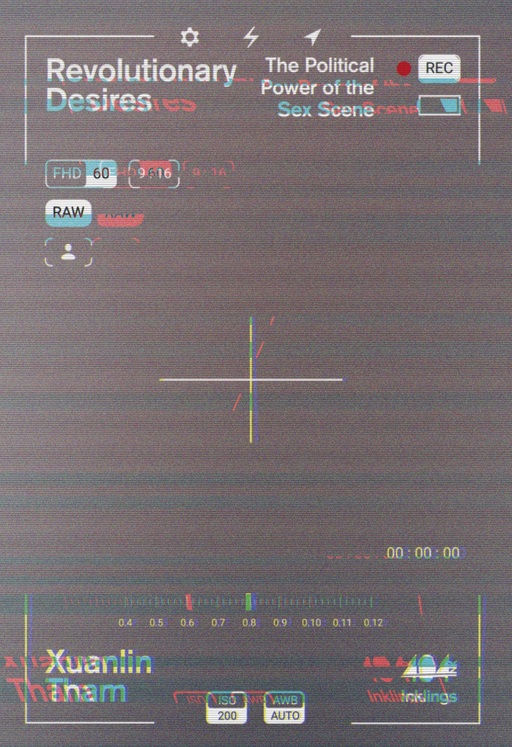Xuanlin Tham on new book Revolutionary Desires
We chat with Edinburgh-based author and film curator Xuanlin Tham about their debut book, an incisive and intricate exploration of the politics of the sex scene
In Revolutionary Desires, the newest Inkling from Scottish indie press darlings 404 Ink, film writer and interdisciplinary arts curator Xuanlin Tham faces the reactionary tide against sex scenes head-on, challenging us to interrogate how depictions of desire came to be such a ‘highly charged symbolic battleground’. In guiding us through a Criterion Closet of carnality – from Exotica to Showgirls, Secretary to The Matrix: Reloaded – Tham demonstrates their own rapturous appreciation of, and incisive arguments for, the sex scene as a liberatory tool.
What sparked the initial idea for this book?
I’ve always been very interested in the perverse and the horny in art, so this rising sentiment against sex and eroticism in cinema really alarmed me. I see it as not simply an aesthetic disregard, but a political phenomenon that we can read into to diagnose what we're allowed to feel and experience, and what that says about our wider political lives.
I also kept coming back to this obstacle of apathy and alienation in political organising and how we might confront that. Initially those were separate ideas: the retreat from sex in the public forum, and people no longer being moved to action. But, I started to trace where they intersected, and found they’re more entangled than we might think.
Many critiques of gratuitous or objectifying sex in media have, at least in part, come from a feminist standpoint. When writing the chapter ‘The sex scene under the patriarchy’, how did you approach balancing that original critique with how it's been warped by reactionary forces?
In many ways that chapter was the most difficult to write, precisely because of that. But, ultimately, when we talk about sex on screen as an irredeemable product of the patriarchal gaze, the nuance is lost.
Popular feminism tends to look for a clear delineation of targets, like in financial or social boycotts of a certain person or company. These movements against violent actors or directors are powerful, but is this the be-all and end-all of our political responsibility in this realm? Another dominant thread in culture today is an idealistic sex positivity, infographics which claim that consent and communication will defeat the threat of violation. I think a lot of us know this isn’t true, no matter how much we wish it were.
Seeing representations of how sex is actually felt and experienced, sitting with what is difficult about sex – this can only be found in cinema, because there is no agenda other than to depict something honestly. I worry that sometimes tarring everything with the same brush of potential harm obscures our true political targets.

The book is about sex, but it’s also – particularly the second chapter – about violence. How do you feel the two are linked?
It's interesting that the chapter on sex under the lens of capitalism is the one you pick out as being the most about violence. I wanted to demonstrate how the sex scene can be used to illuminate political violences.
I never wanted to position sex as unproblematic, because sex is not free from politics – and because politics is not free from violence, then sex is not free from violence. It would be a different book if I had argued that the only sex we should celebrate is liberatory sex.
Sex scenes are powerful because they can resist the impulse to gloss over the troubling aspects of sex, and can show how sex replicates the broader patterns of harm in capitalist societies – where people are commodities, and we're alienated from our true wants and desires.
Since the #MeToo movement, there’s been a growing responsibility to consider the conditions in which these scenes are produced. What are your thoughts on the push towards intimacy coordinators as a nominally feminist way to prevent violations on set?
This is what a lot of people assume the book is about, and I think that speaks to its current overemphasis in the discourse. Intimacy coordinators have existed in performance sectors for a long time, but it’s now being construed as a way to ‘solve’ the ‘problem’ of sex on screen – and I just don't believe anything will.
It is a saviour figure that will inevitably disappoint us. There will still be grey areas, things can still go wrong, unexpected harms can still come up. That is a reality that we must deal with.
The sex scene is one of the few places where we seem determined to eliminate grey areas – but violations happen in offices, schools, doctors' offices and surgical theatres. The visibility of film and TV means we feel as though we can tackle it, whether that is by removing men from director's chairs or having an intimacy coordinator. But we need the language and frameworks to talk about it elsewhere, and I think the sex scene can help to give us that.
Revolutionary Desires is out with 404 Ink on 6 Mar
Xuanlin Tham will be launching their book at Lighthouse Bookshop, Edinburgh, on 12 Mar at 7pm and has curated Your Body, Dissolving into Me, a short film programme exploring sex as a dissolution of boundaries, at Glasgow Short Film Festival on 20 Mar at 10pm
